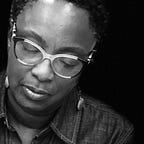Is ‘Taking Up Space’ Even Necessary, Or Should We Just Be Our Best Selves?
Recently, while talking with one of my former students, now a college student, on the verge of graduating, we discussed what it means to “take up space”. He has had a life fraught with obstacles, but despite that, he has made some extraordinary achievements. He is aware of how he is perceived in the larger society and doesn’t want to be a poster boy for toxic masculinity. Hence, my admonition to him that as a young, Black male, he must not shrink himself to please anyone. It is his right to be expressive, to be free and proud in his own skin, to present himself to the world as a fully formed human being. As always, I tempered my words by telling him to be kind and to remain honest to himself and to others. We talk often of karma and the universe’s dislike of hubris and “big heads” therefore he should be cognizant of his speech and actions. In the wake of the incident between Chris Rock and Will Smith, this advice resonates even more.
Feeling Powerless As A Child
During a recent conversation, I reminisced about growing up in Barbados as a dark-skinned, little girl from a working-class family, where there was no space for me. Having a certain skin color and class were requisite vehicles for social mobility and I possessed no ticket for either. From a young age, I observed that with the exception of a few, most women were passive subjects. To get a better understanding of myself as a child, I recently asked my childhood friend to describe me as she remembered, over 50 years ago. She said I was a “vigilant, perceptive girl, with a surly manner bordering on rude. Your eyes were bright and sparkled with intelligence and awareness far beyond my years”. Maybe, I acquired this disposition from knowing I was powerless. I could not make things happen, instead, things happened to me.
Because of what I witnessed, I was determined not to tread too lightly through life. I saw that most spaces in my world: the church, the library, the supermarket, transportation, the bakery, schools (with some exceptions) were controlled by men. A patriarch would cast a menacing stare and people would scatter. A man would enter a room and all voices would be stilled. To me, women were complicit in their acquiescence because they were housewives or because they saw it as their God-given duty to defer, ceding what little space they possessed. I always wondered, how they honestly felt about the lives they lived?
Walking Like a Boss
I do not know when my desire to be acknowledged as a person, needing to take up space, physically manifested in the way I walked. Somewhere in my late teens, my steps became precise and firmly placed, my head and torso erect. At my first job at a legacy publishing company in Manhattan, I acquired the nickname of “Queen”, for the way I sashayed about my clerical duties. I remember once, in my late 40s, walking across the windswept careenage in Barbados, and a stranger commented that I walked like a woman who knew where she was going. I reveled in that observation.
Throughout my years in the classroom, my students often critiqued my formidable gait. They said they knew when I was coming down the hallway before they caught sight of me because they would recognize my shoes clicking on the tile. Male colleagues would comment on my powerful steps and I took it all in stride.
As a medical student, my daughter warned me that my footfalls were too heavy, and I would suffer as I aged. The neck and torso are still intact, but my knees have become my Achilles heels. They hurt if I walk for extended periods and anything that calls for bending must be carefully choreographed. For decades I associated taking up space with having a commanding presence and a kick-ass attitude. Now, as I watch my daughter, who treads lightly, who speaks softly, and quietly approaches most things, without any fanfare, I’m learning that there are different ways to take up space. Maybe filling the space inside with compassion and honesty is more important? What do you think?
